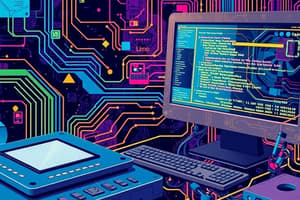Podcast
Questions and Answers
What is the main function of an operating system?
What is the main function of an operating system?
- Managing computer hardware resources (correct)
- Creating software applications
- Organizing files and folders
- Providing security against malware
Which function of an operating system involves implementing anti-virus software and security updates?
Which function of an operating system involves implementing anti-virus software and security updates?
- Security and protection (correct)
- Managing hardware resources
- Providing a user interface
- File management
What does an operating system provide to allow users to interact with the computer and run applications?
What does an operating system provide to allow users to interact with the computer and run applications?
- File organization tools
- Hardware resources
- Security against viruses
- User interface (correct)
Which function of an operating system enables users to organize their files and folders?
Which function of an operating system enables users to organize their files and folders?
What does an operating system provide as a platform for other software applications to run?
What does an operating system provide as a platform for other software applications to run?
Which feature of an operating system involves allocating memory, processing power, and storage to different software programs?
Which feature of an operating system involves allocating memory, processing power, and storage to different software programs?
Which company developed the Windows operating system?
Which company developed the Windows operating system?
What type of operating system is macOS?
What type of operating system is macOS?
Which operating system is known for being highly customizable and open-source?
Which operating system is known for being highly customizable and open-source?
What type of interface do modern operating systems use for user interaction?
What type of interface do modern operating systems use for user interaction?
In the future, what will operating systems likely focus on as technology evolves?
In the future, what will operating systems likely focus on as technology evolves?
What does an operating system manage in a computer system?
What does an operating system manage in a computer system?
What is the purpose of a graphical user interface (GUI) in an operating system?
What is the purpose of a graphical user interface (GUI) in an operating system?
What will help computing power unify users' lives online in the future according to the text?
What will help computing power unify users' lives online in the future according to the text?
What does an operating system provide for software applications according to the text?
What does an operating system provide for software applications according to the text?
What will operating systems need to adapt to in the future according to the text?
What will operating systems need to adapt to in the future according to the text?
Study Notes
Understanding Operating Systems
An operating system (OS) is the most important software that runs on a computer, managing its memory, processes, and all of its software and hardware. It acts as a bridge between computer hardware and software, allowing them to communicate with each other. Without an OS, a computer would not be able to perform any useful tasks.
Key Functions of an Operating System
-
Managing Hardware Resources: The OS allocates hardware resources such as memory, processing power, and storage to different software programs running on the computer.
-
Providing a User Interface: Operating systems provide a user interface, allowing users to interact with the computer and run applications.
-
Security and Protection: OSes provide protection against viruses and malware by implementing security anti-virus software and regular security updates.
-
File Management: Operating systems enable users to organize their files and folders in a logical and efficient manner, providing tools such as file explorer, search, and sorting options.
-
Platform for Software Applications: An operating system provides a platform for other software applications to run, offering an application programming interface (API) that software developers can use to create and run their applications.
Types of Operating Systems
There are various types of operating systems, but the most common ones for personal computers are:
- Windows: A popular operating system developed by the Windows Corporation.
- macOS: Developed by Apple, this operating system is used on Mac computers.
- Linux: An open-source operating system that is highly customizable and can be used on various hardware platforms.
Modern operating systems use a graphical user interface (GUI), which allows users to interact with the computer using a mouse and other input devices. GUIs provide a combination of graphics and text to display information and make the user experience more intuitive.
The Future of Operating Systems
As technology continues to evolve, operating systems will need to adapt to meet the changing needs of users and software developers. In the future, operating systems and information management tools will likely grow top-down, focusing on simplicity and user experience. This will help computing power unify users' lives online and make it easier to manage information.
In conclusion, an operating system is a critical component that manages computer hardware and software, providing a user interface, security, file management, and a platform for software applications. As technology continues to advance, operating systems will need to adapt to new user demands and expectations, focusing on simplicity and user experience.
Studying That Suits You
Use AI to generate personalized quizzes and flashcards to suit your learning preferences.
Description
Explore the key functions of an operating system, such as managing hardware resources, providing user interfaces, security, file management, and platforms for software applications. Learn about the types of operating systems including Windows, macOS, and Linux, and understand how operating systems will need to adapt to meet the changing needs of users and software developers in the future.



